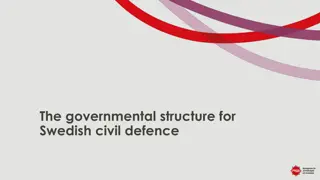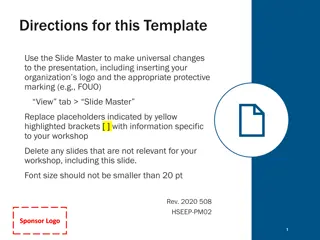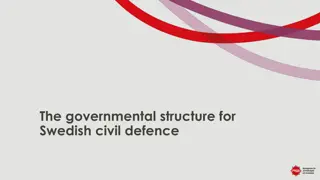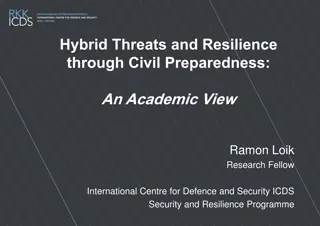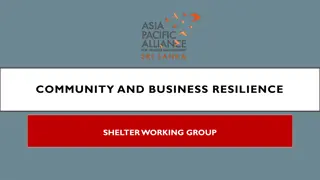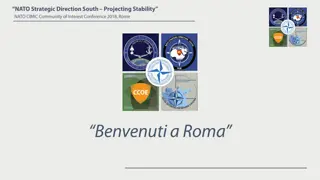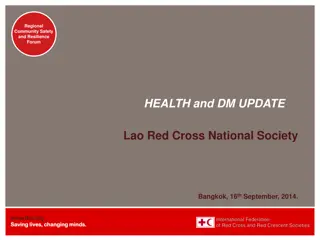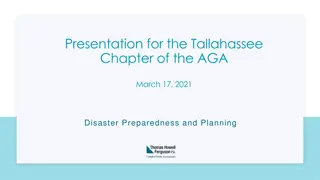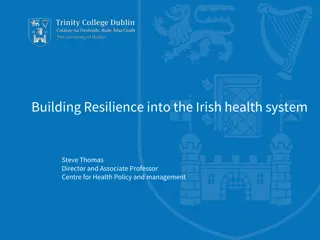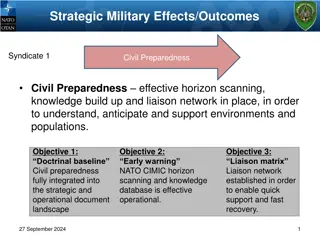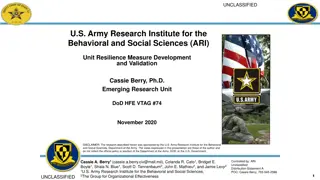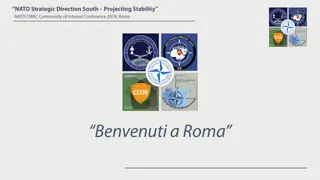Enhancing Resilience Through Civil Preparedness Outbrief Syndicate Report
This detailed report outlines objectives and strategies for enhancing civil preparedness through effective horizon scanning, knowledge building, and liaison networks in order to support environments and populations. It includes a draft resilience mission statement and initiatives to sustain, improve, and develop leadership in civil-military cooperation. The report stresses on doctrine integration, early warning mechanisms, and enhancing analytical capabilities for improved response at all levels.
Download Presentation

Please find below an Image/Link to download the presentation.
The content on the website is provided AS IS for your information and personal use only. It may not be sold, licensed, or shared on other websites without obtaining consent from the author.If you encounter any issues during the download, it is possible that the publisher has removed the file from their server.
You are allowed to download the files provided on this website for personal or commercial use, subject to the condition that they are used lawfully. All files are the property of their respective owners.
The content on the website is provided AS IS for your information and personal use only. It may not be sold, licensed, or shared on other websites without obtaining consent from the author.
E N D
Presentation Transcript
Resilience through Civil Preparedness Outbrief Syndicate 1\2
05 October 2024 3 Civil Preparedness Civil Preparedness effective horizon scanning, knowledge build up and liaison network in place, in order to understand, anticipate and support environments and populations. Objective 1: Doctrinal baseline Civil preparedness fully integrated into the strategic and operational document landscape Objective 2: Early warning NATO CIMIC horizon scanning and knowledge database is effective operational. Objective 3: Liaison matrix Liaison network established in order to enable quick support and fast recovery.
DRAFT RESILIENCE MISSION STATEMENT: NATO CIMIC is continiously facilitating complementary support through it s core functions to enhance resilience of nations/allies IOT enable NATO operations and missions
SUSTAIN: Doctrine Concept development NDPP questionaire Organization Utilizing NFIUs Training Incorporating resilience in trainings Infosheet / factsheet Material Use of open source information
SUSTAIN: Leadership Proactivity Leadership resilience awareness National CEPP Personnel Resilience Advisory Teams Interoperability Use of english Exercises (MNCG DORR and TRJE)
IMPROVE: Doctrine: MC411/3 CIMIC IN ARTICLE 3/5 CONCEPT/ D&G RULES /RESPONSE ON ALL LEVEL FROM STRATEGICAL TO TACTICAL Organization: ANALITICAL CAPABILITY COEs NETWORK CIMIC UNITS INTEGRATION INTERNALLY/EXTERNALLY, LACK OF G9 FOCUS IN HQ
IMPROVE: TRAINING: OSINT COURSE LEVEL OF TRAINING RESILIENCE AND CIMIC FROM BDE UP TO DIV INCORPORATE INTO EX SCENARIOS, AWARENESS OF GRP AND CIMIC RESPs IO,NGO PARTICIPATION IN EXERCISES INFLUENCE LEADERS INT/EXT ABOUT CIMIC CORE VALUES DEVELOPING STRATEGIC THINKERS AND PLANNERS MATERIAL: LIVE MONITORING RESILIENCE TOOL CIMIC WEBSITE ENGAGEMENT WITH NMA, INCORPORATE RESILIENCE INTO DATABASE
IMPROVE: LEADERSHIP: WHOLE OF GOV APPROACH NO FOCAL POINT/UNCLEAR FRAMEWORK CCIRS FOCUSED ON RESILIENCE RELATIONSHIP W/ NMA/ NATO CENTRIC VISION PERSONEL: SEC CLASSIFICATION, CHURN ROTATION CIVILIAN SME AT ALL ECHELONS, DATABASE OF SMEs INTEROPERABILITY: INFOSHARING: UNDERSTANDING DIFFERENT NATIONAL APPROACHES TO CIV EMER. PROCEDURES, EXERCISE PLANNING & EXECUTION, COOP/COORD WITH EU, CLASSIFICATION ISSUES MIL TERMINOLOGY VS CIV LANGUAGE DEV SA ON CIV PREP VIA SOCIAL MEDIA, VERTICAL INFO SHARING COMMON OPERATING SYSTEM BETTER INTERACTION ACO AND ACT ON RESILIENCE, USE OF TOPFAS
INNOVATE: Doctrine: Bi-SC Directive Organization: Working group/board for resilience Resilience in Battle Rythm Training: Training platform with all stakeholders Collaborative NATO/EU courses Improve the analytical skills Material: Info sharing platform for military and civilian
INNOVATE: Leadership: NATO champion for resilience Established and sustained CMI Personnel: Dedicated trained CIMIC focal points for resilience Standardized job descriptions Interoperability: Use of common decision making tools
DROP: Doctrine Organization Stovepiping information Actions without coordination / authorisation Training Substitute civilians with military roleplayers Material
DROP: Leadership Leadership reactionary to problems or setbacks Personnel Interoperability Over classified information Duplication of efforts



